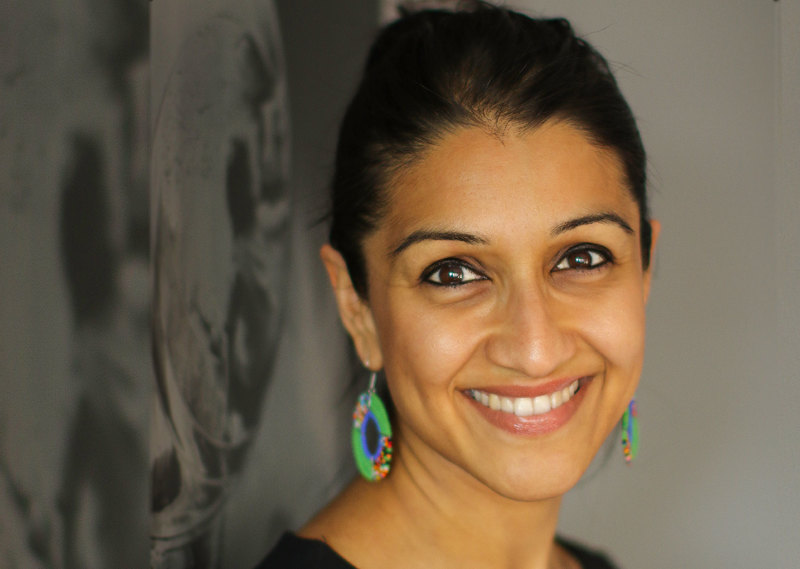Ameeta Jaga: thinking about work–family balance
13 April 2021 | Story Robert Morrell. Photo Supplied. Read time 5 min.
Associate Professor Ameeta Jaga has been leading a research project on breastfeeding trends in the textile industry in the greater Cape Town region for the past three years. The research seeks to explain why South African breastfeeding rates are so low (among the lowest in the world), especially among employed mothers.
Breastfeeding at the workplace
South Africa has progressive policies which allow mothers breastfeeding breaks at work. Yet very few mothers seem to take up this opportunity. Is this because they don’t know about this policy or because factory managers discourage breastfeeding? Or is it because of other reasons? In this project, Ameeta and her research team have been seeking answers to these questions.
Breastfeeding is often viewed as a health, community and family issue, and rarely as a workplace concern. Ameeta reflects: “I discovered many years ago that South Africa had the lowest breastfeeding rates and that this had detrimental consequences for the already high levels of malnutrition and women’s health, and for upward mobility and our GDP. While there are several reasons why women stop breastfeeding or choose not to at all, a major reason is returning to work out of economic necessity.”
Collaboration and multidisciplinary work
Ameeta approaches this situation from her home discipline, organisational psychology. She realised that the situation of low-income women in work environments was very complex, so she developed a multidisciplinary approach with multiple partners.
Ameeta formed collaborations with the Western Cape Government and the South African Clothing and Textile Workers’ Union to ensure that her research had practical consequences for improving gender inequality at work. She also developed a multidisciplinary team comprised of partners from the fields of nutrition (Tanya Doherty, South African Medical Research Council), management (Bianca Stumbitz, Middlesex University) and anthropology (Yusra Price), as well as her PhD student Bongi Mabaso.
Southern Theory
The location of her research in South Africa – a middle-income country with challenges associated with the recent past under apartheid and high levels of poverty and unemployment – pushed Ameeta to draw on Southern Theory. Southern Theory refers to theoretical approaches which highlight the importance of location and the geopolitics of resource distribution. The Global South still, in some respects, feels the effects of marginalisation. Frequently, research conducted in the Global North is assumed equally to apply to the Global South, and the specific conditions of the South are ignored.
Ameeta realised that the current labour policies on breastfeeding breaks were not acknowledging the material circumstances of low-income women. Driven by economic necessity, these low-income mothers subordinate their physical and emotional relationship with their babies to the expectations of their workplace. In the non-work space, social and structural determinants associated with difficult commutes, caring for extended families and poor living conditions place breastfeeding as a minor priority.
Ameeta’s projects have already resulted in minor changes in the Western Cape Department of Health’s policy on breastfeeding at work. Forms of support for breastfeeding women at work now extend beyond legislation.
The project has also resulted in three publications in 2020 in the journals Community, Work and Family; Gender, Work and Organization; and International Breastfeeding Journal. Through actively working to address the geopolitics of knowledge production in work–family research, Ameeta was elected to the executive boards of the Global Organisation for Humanitarian Work Psychology in 2020 and the Work and Family Researchers Network in 2021.
Presenting at conferences
Insofar as the future is concerned, Ameeta plans to extend her work in two ways: by connecting breastfeeding as a form of foodwork labour to the workplace labour discourse and by rethinking the work–family boundaries from the perspective of the Global South. She will present her ideas at the Brighton and Sussex Universities Network Food Studies seminar series (April 2021) and as a keynote address for the Equality, Diversity and Inclusion track at the 19th International Labour and Employment Relations Association World Congress (June 2021).
 This work is licensed under a Creative Commons Attribution-NoDerivatives 4.0 International License.
This work is licensed under a Creative Commons Attribution-NoDerivatives 4.0 International License.
Please view the republishing articles page for more information.






